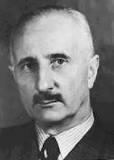
Władysław Tatarkiewicz [vwaˈdɨswaf tatarˈkʲevitʂ]; (Warsaw, April 3, 1886 - Ib., April 4, 1980) was a Polish philosopher, researcher in the history of philosophy, art, and aesthetics, a field in which he published numerous works.
Tatarkiewicz began higher education at the University of Warsaw; but when it was closed by the Russian Empire, in 1905, he continued his studies at the University of Marburg.
As recounted in his 1979 Memoirs, it was an encounter with a relative at a Krakow train station at the beginning of World War I that led Tatarkiewicz to spend the war years in Warsaw. There he began his career as a Philosophy teacher, in a girls' school on Mokotowska Street, near the place where Józef Piłsudski would reside for a time after the end of the First World War.
Tatarkiewicz headed the Philosophy department of the Polish University in Warsaw from 1915 to 1919, when it began, under the patronage of the German occupiers who wanted to win Polish support for the war). From 1919 to 1921 he was a professor at Stefan Batory University in Vilna; from 1921 to 1923 at the University of Poznań; and, from 1923 to 1961 again at the University of Warsaw. Since 1930 he was a member of the Polish Academy of Sciences
During World War II, he conducted clandestine conferences in German-occupied Warsaw, putting his life at risk (one of the attendees was Czesław Miłosz). After the Warsaw Uprising (August to October 1944), he again put his life at risk, recovering a manuscript that a German soldier had thrown into a binder to destroy it. This and other texts were later published in the book On Happiness.
Tatarkiewicz belonged to the Lviv-Warsaw School (Szkoła lwowsko-warszawska) from the interwar period, created by Kazimierz Twardowski, which gave Poland important scientists and academics: philosophers, psychologists, sociologists and scholars of logic.
Władysław Tatarkiewicz died the day after his ninety-fourth birthday.




